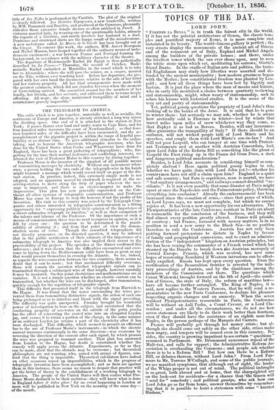THE TELEGRAPH TO AMERICA.
The cable which is to join together, materially as well as socially, the continents of Europe and America, is already stretched a long way across the dividing space. One end of it is attached to the station at New York; it passes thence over land and under water to Cape Race, and for four hundred miles traverses the coast of Newfoundland ; so that four- teen hundred miles of the difficulty have been surmounted, and the ac- complishment of the gigantic project is within the range of hopeful pro- bability at no distant time. To give additional stimulus to the under- taking, and to honour the American telegraphic inventor, who has done for the United States what Cooke and Wheatstone have done for England, there has been a great gathering of telegraphists; who, for- getting for the time their mutual jealousies and conflicting interests, ce- lebrated the visit of Professor Morse to this country by dining together.
Professor Morse is the inventor of the simplest of all possible means of transmitting messages by electricity. Without any instrument what- ever a person holding the two ends of the telegraph-wire in his hands might transmit a message which would record itself on paper at the dis- tant station. In practice, indeed, this extremely simple mode is not adopted, and an apparatus moved by clockwork is required at the re- ceiving-station to move along the strip of paper whereon the mes- sage is impressed, and there is an electro-magnet to make the impressions. This plan has now generally superseded on the Con- tinent all other systems of telegraphic communication, and Professor Morse has come to Europe to reap the honours if not the profits of his invention. His visit to this country was seized by the Telegraph Com- .paniea and others interested in telegraphic communication as a fitting opportunity for " expressing publicly their opinion of the importance of a direct submarine telegraph to America," as well as their estimation- of the talents and labours of the Professor. Of the importance of such a means of communication there was no need to express an opinion, as it is felt by every one : the question to be determined is the practi- cability of attaining it ; and from that point of view the demon- stration seems of value. Though the assembled telegraphists did not directly pronounce on the disputed question, it may be inferred that in the public notification of their estimate of the importance of a submarine telegraph to. America was also implied their assent to the practicability of the project. The speeches at the dinner confirmed this inference ; and it was shown that the difficulties encountered and over- come in laying down the Mediterranean cable have been as great as any that would present themselves in crossing the Atlantic. So far, indeed, as regards the wire-connexion between the two countries, there seems no doubt that it can be made - but that mechanical difficulty overcome, there will remain the question whether telegraphic signals can be transmitted through a submerged wire of that length, however carefully it may be insulated. On this point electricians and mathematicians are at variance. It is not a simple question whether an electric current can be transmitted, but whether the wire can be discharged, after transmission, quickly enough for the repetition of telegraphic signals. This difficulty first presented itself in the telegraph from Harwich to the Hague. It was found that the water surrounding the wires pre- vented them from transmitting distinctive signals, the action of each one being prolonged so as to interfere and blend with the signal preceding. The difficulty was quite unexpected. Faraday brought his wonderful power of investigation to bear on the subject, and ascertained that the conducting property of sea-water on the outside of the gutta percha has the effect of converting the coated wire into an elongated Leyden jar, and causes it to retain a portion of the charge, in the same manner ?San ordinary Leyden jar retains a part of the electricity after it has been discharged. This difficulty, which seemed to present an effectual bar to the use of Professor Morse's instruments—in which the electric current traverses continuously in the same direction—was overcome by reversing the direction of the current after each signal, by which process the wire was prepared to transmit another. That plan has answered from London to the Hague, but doubt is entertained whether the remedy will apply across the Atlantic. Experiments, so far as they ran be made, show that the obstacle may be overcome ; but theoretical philosophers are not wanting, who, armed with arrays of figures, con- tend that the thing is impossible. Theoretical calculators have indeed on other occasions raised up impossibilities, which in the progress of telegraphic invention have been accomplished ; and as facts are against them in this instance, there seems no reason to despair that practice will get the better of theory in the establishment of a working telegraph to America. The people of the United States will then realize what Pro- fessor Morse declared to be their ambition—they will know what is done in England before it takes place ! for an event happening in London at noon will be published in New York on the morning of the same dep- ot' the month.


























 Previous page
Previous page